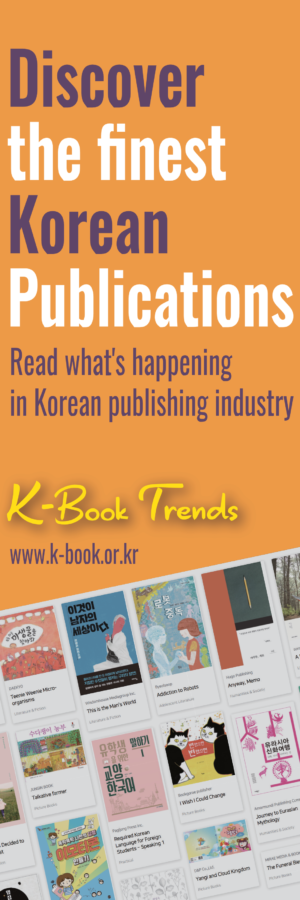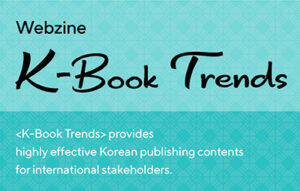Current status of each field in the Korean publishing market
⑥ Self-Development Publications
2020.07.13
 Self-development books in Korea are referred to as those related to the know-how on social relationships, success, skill cultivation, and educational tips. Put in other words, they are like guide books to live a better life. Among general books published for adult readers, self-development books are regarded as the low-level genre for practical books. As they are not specified to a particular genre, some books of this kind are put on the boundary between different fields or have several genres mixed in them. The reason readers choose to read self-development books is to pull themselves up to the next level through behavioral changes and positive mindsets and to carry out a successful social life. As such, these books give courage and hope to their readers encouraging them that they can do whatever they resolve to do.
Self-development books in Korea are referred to as those related to the know-how on social relationships, success, skill cultivation, and educational tips. Put in other words, they are like guide books to live a better life. Among general books published for adult readers, self-development books are regarded as the low-level genre for practical books. As they are not specified to a particular genre, some books of this kind are put on the boundary between different fields or have several genres mixed in them. The reason readers choose to read self-development books is to pull themselves up to the next level through behavioral changes and positive mindsets and to carry out a successful social life. As such, these books give courage and hope to their readers encouraging them that they can do whatever they resolve to do.
The sales revenue of self-development books in Korea is analyzed to have increased an average of 5% for the past 3 years.
Approximately 10.3% (multiple responses allowed) of Korean publishers were publishing self-development books. Also, about 2.5% of them are mainly specialized in publishing self-development books (KPIPA, <Publication Industry Survey 2019>). According to <Publishers in Korea: 486 (2019)>, a data collection of member publishers announced by the Korea Publishers Association, 21 publishers (about 4.3%) claimed to have self-development books as their major publication field. In other words, 1 out of 10 Korean publishers are producing self-development books, while some among them are specialized in the field.
According to the publication statistics released by KPIPA in 2018, the number of self-development titles published was 1,490, where it hasn’t changed much ranging around 1,500. Also, if we look at the 2019 sales record of Kyobo Bookstore, a representative on- and off-line bookstore in Korea, about 4% of its total sales were from self-development books. It showed that the sales revenue of the field increased by 5% on an annual basis during the recent 3 years. These all imply that even though the number of titles or market size could be smaller than other fields, self-development can be regarded as a relatively stable field as well.
So, what kind of people look for self-development books? The major readership is college students in their 20s and young working population in their 30s. These are age groups that put effort into achieving productive results, cultivate skills, and well-managed human relationships with a relatively strong desire to change themselves in a better way. Here, books containing helpful and valuable advice and encouragement about the right attitudes toward life and social relationships work as a guide in life to follow in their footsteps. Meanwhile, essay-style books that readers can flip through without feeling pressure to learn something from them are popular in particular, as they unfold the necessary principles and know-how for successful life while introducing cases with high readability.
The self-development book market is largely divided into two: translated works and Korean works. Books from the US and Japan used to be traditionally influential in the market in terms of translated works, but recently, those from China are particularly building steam. Major topics covered are building good habits, presentation skills, managing emotions, working know-how, cultivating personal abilities, and how to cope with people at work, which all provide advice for a successful life, human relationships, communication, and a passionate attitude. In some cases, books that instead seem to be liberal arts or economics & business administration books emerge as most-read self-development books.
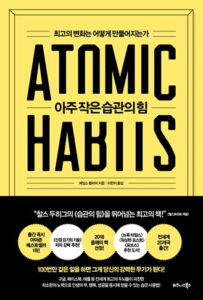

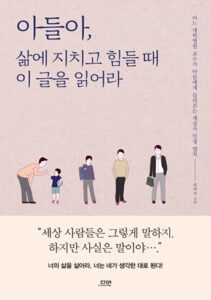
<Atomic Habits>, <Grit>, <Son, Read When You Are Exhausted in Life>
It is not easy to throw off bad habits and build good ones. As people have difficulty cutting off their bad habits, “habit” is a common topic. <Atomic Habits (Business Books)> written by James Clear, a self-development specialist, persuasively tells how changing habits can change your life based on recent research from brain science or psychology. Meanwhile, important elements in social life and communication are speaking and writing. Translated works from China take the upper list of bestsellers in these fields; it is a bit odd to see how many of those works linked the story to Havard University. Spotlighted books were <Harvard Speaking Class (Readlead Pub.)> by Liu Lina, the writer of multiple bestsellers in China, and <How to be an Attractive Speaker (Davinci House)> by Jang Chao, a communication specialist.
The key to success is passion and behavior. <Grit (Business Books)> written by Angela Duckworth, a psychologist in the US., emphasizes the power of passion and the tenacious power of ‘grit’. While stressing that the secret to a successful career is not talent but the combination of passion and patience, the book is now on the shelves again as a re-covered edition marking the 100th print since it was first published in 2016. Popular books about passion and attitudes include <Attitude (0509 Books)> by Wu Jun, a venture investor in Silicon Valley, consisting of his advice for his daughter and <Son, Read When You Are Exhausted in Life (DayeonBook)> by professor Yoon Dae-Jin from Seoul National University Hospital that tells his son how to manage himself to live through the world with a father’s love.
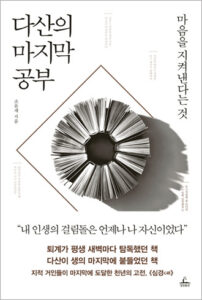
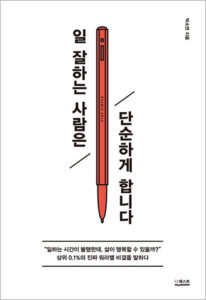
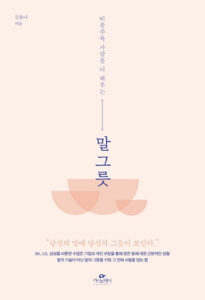
<Dasan’s Last Study>, <High Performers Know How to Stay Simple>, <A Vessel of Humanity That Fills Up Endlessly>
<Dasan’s Last Study (Chungrim)> by Cho Yoon-Je, researcher of classical study, was the most popular Korean self-development book last year. It introduces <Shimkyung (心經)>, which was a bestseller during the Joseon Dynasty and said to have been the favorite book of Toegye Yi Hwang and Dasan Jeong Yak-Yong. <Shimkyung> is a book which Jin Deok-Soo, a Confucianist from the Song Dynasty, China, selected and interpreted parts related to calming one’s mind from several scriptures including the Seven Chinese Classics. While magnificent enough to be called a humanitarian liberal arts book, the publisher’s clever choice of titling it <Dasan’s Last Study> regardless of its irrelevance to the content actually worked in boosting sales.
Also, <Skillful People Talk Simple (The Quest)> written by Park So-Yeon, a consultant on leadership, is a follow-up work of her <High Performers Know How to Stay Simple (The Quest)>. It instructs office workers how to use different words and language at work and in daily lives, arguing that the two differ. In addition, <A Vessel of Humanity That Fills Up Endlessly (Cassiopeia)> by Kim Yoon-Na and <Writing Bible: O.R.E.O (Uknowbooks)> are also mentors of talking and writing. Meanwhile, <A Little Sense Could Make You Rich (Wisdom House)> by Kim Joo-Ha, a consultant on boosting sales, emphasizes that how you talk determines how much money you make with the sub-title “The Joo-Ha Secret: You, too, can bring up sales by 30-fold!”
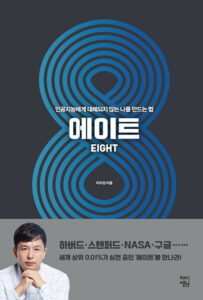
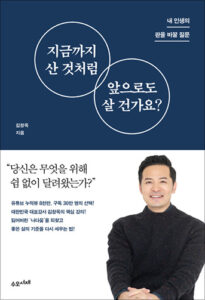
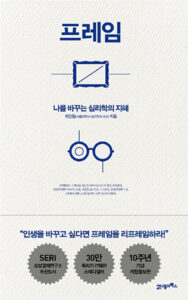
<Eight>, <Will You Live Rest of Your Life Unchanged?>,
Revised & Enlarged Edition marking 10th anniversary of <Frame>
<Eight (Chaijungwon)> by Lee Ji-Sung, a well-known author for self-development books, offers 8 methods including “think philosophical” to improve yourself against the A.I. emerging in the advent of the 4th industrial revolution. Also, <I Saw the Future at Amazon (Hanbit Biz.)> by Park Sung-Joon talks about the “Amazon style” he learned while working at Amazon for 12 years and how to “design your life and career.” Moreover, <Are You Going to Keep Living as You Have Lived? (Suo Books)> written by Kim Chang-Ok, a leadership consultant, is claimed to be a self-revolutionary guideline. <How to Study Perfect (ROK MEDIA)> by Ko Young-Sung and Shin Young-Joon suggests how to study for further success and development. Not to mention the famous <The Secret of Thinking (Golden Lion Books)> by CEO Kim Seung-Ho, a businessman who reaped success in a US food company and is currently running the world’s largest lunchbox company.
<Frame (2007, Book 21)> by Choi In-Chul, a professor of psychology at Seoul National University who had been a professor at the University of Illinois, is a steadily-selling title containing psychological wisdom with 400 thousand copies sold. Its revised and enlarged edition marking the 10th anniversary is drawing attention among readers. Here, the word “frame” in the title refers to the frame of mind opened towards the world. His new work <Good Life (2018, Book 21)> delivers the psychological wisdom that helps improve your life. Its title “good life” refers to a life that looks at the world within a good “frame.”
Self-development books give courage and hope to their readers, encouraging them that they can do whatever they wish to do.
Major publishers in the field of self-development in Korea are Business Books, Tornado, Book 21, Chungrim, Wisdom House, Woongjin Thinkbig, Sam & Parkers, Hanbit Biz., Forest Books, Hankyung BP, Gilbut, Dasan Books, and Cassiopeia. Being supporters for those dreaming of a better tomorrow through books, further diversification and evolution of publishers for self-development books are indeed anticipated in the future.
Written by Won-Keun Baek (Books & Society Research Institute, President)

